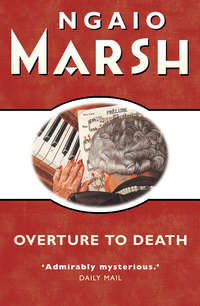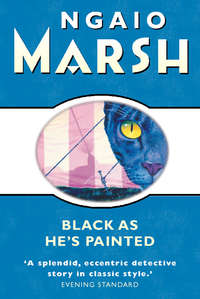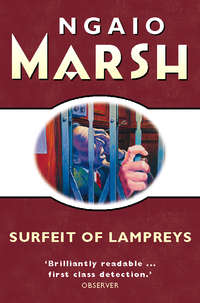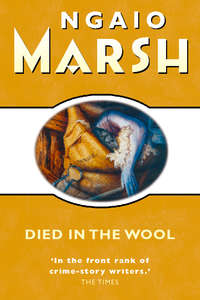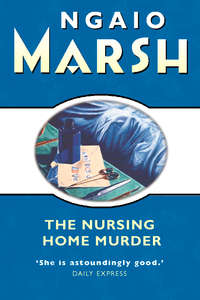
Полная версия
False Scent
Anelida finished her tulips and looked directly at him. ‘I’m sure it’ll work out,’ she said gently. ‘All very fine, I dare say, for me to say so, but you see, you’ve talked so much about her, I almost feel I know her.’
‘I very much want you to know her. Indeed, this brings me to the main object of my pompous visit. Will you let me call for you at six and take you to see her? There’s a party of sorts at half-past which I hope may amuse you, but I’d like you to meet her first. Will you, Anelida?’
She waited too long before she said: ‘I don’t think I can. I’m – I’ve booked myself up.’
‘I don’t believe you. Why won’t you come?’
‘But I can’t. It’s her birthday, and it’s special to her and her friends. You can’t go hauling in an unknown female. And an unknown actress, to boot.’
‘Of course I can.’
‘It wouldn’t be comely.’
‘What a fantastic word! And why the hell do you suppose it wouldn’t be comely for the two people I like best in the world to meet each other?’
Anelida said: ‘I didn’t know –’
‘Yes, you did,’ he said crossly. ‘You must have.’
‘We scarcely know each other.’
‘I’m sorry you feel like that about it.’
‘I only meant – well, in point of time –’
‘Don’t hedge.’
‘Now, look here –’
‘I’m sorry. Evidently I’ve taken too much for granted.’
While they stared aghast at the quarrel that between them they had somehow concocted, Octavius came tapping back. ‘By the way,’ he said happily, ‘I yielded this morning to a romantic impulse, Dakers. I sent your patroness a birthday greeting: one among hundreds, no doubt. The allusion was from Spenser. I hope she won’t take it amiss.’
‘How very nice of you, sir,’ Richard said loudly. ‘She’ll be enchanted. She loves people to be friendly. Thank you for finding the picture.’
And forgetting to pay for it, he left hurriedly in a miserable frame of mind.
III
Mary Bellamy’s house was next door to the Pegasus bookshop, but Richard was too rattled to go in. He walked round Pardoner’s Place trying to sort out his thoughts. He suffered one of those horrid experiences, fortunately rare, in which the victim confronts himself as a stranger in an abrupt perspective. The process resembles that of pseudo-scientific films in which the growth of a plant, by mechanical skulduggery, is reduced from seven weeks to as many minutes and the subject is seen wavering, extending, elongating itself in response to some irresistible force until it breaks into its pre-ordained florescence.
The irresistible force in Richard’s case had undoubtedly been Mary Bellamy. The end-product, after twenty-seven years of the treatment, was two successful West End comedies, a third in the bag, and (his hand tightened on his dispatch-case) a serious play.
He owed it all, as he had so repeatedly told her, to Mary. Well, perhaps not quite all. Not the serious play.
He had almost completed his round of the little Place and, not wanting to pass the shop window, turned back. Why in the world had he gone grand and huffy when Anelida refused to meet Mary? And why did she refuse? Any other girl in Anelida’s boots, he thought uneasily, would have jumped at that sort of invitation: the great Mary Bellamy’s birthday party. A tiny, hand-picked group from the topmost drawer in the London theatre. The Management. The producer. Any other girl … He fetched up short, not liking himself very much, conscious that if he followed his thoughts to their logical conclusion he would arrive at an uncomfortable position. What sort of man, he would have to ask himself, was Richard Dakers? Reality would disintegrate and he would find himself face-to-face with a stranger. It was a familiar experience and one he didn’t enjoy. He shook himself free of it, made a sudden decision, walked quickly to the house and rang the bell.
Charles Templeton breakfasted in his study on the ground floor. The door was open and Richard saw him there, reading his Times, at home among his six so judiciously chosen pieces of chinoiserie, his three admirable pictures, his few distinguished chairs and lovely desk. Charles was fastidious about his surroundings and extremely knowledgeable. He could wait, sometimes for years, for the acquisition of a single treasure.
Richard went in. ‘Charles!‘ he said. ‘How are you?’
‘Hallo, old boy. Come to make your devotions?’
‘Am I the first?’
‘The first in person. There are the usual massive offerings in kind. Mary’ll be delighted to see you.’
‘I’ll go up,’ Richard said, but still hovered. Charles lowered his newspaper. How often, Richard wondered, had he seen him make that gesture, dropping his eyeglass and vaguely smiling. Richard, still involved in the aftermath of his moment of truth, if that was its real nature, asked himself what he knew of Charles. How used he was to that even courtesy, that disengagement! What of Charles in other places? What of the reputedly implacable man of affairs who had built his own fortune? Or of the lover Charles must have been five-and-twenty years ago? Impossible to imagine, Richard thought, looking vaguely at an empty niche in the wall.
He said: ‘Hallo! Where’s the T’ang Musician?’
‘Gone,’ Charles said.
‘Gone! Where? Not broken?’
‘Chipped. The peg of her lute. Gracefield did it, I think. I’ve given her to Maurice Warrender.’
‘But – even so – I mean, so often they’re not absolutely perfect and you – it was your treasure.’
‘Not now,’ Charles said. ‘I’m a perfectionist, you know.’
‘That’s what you say!’ Richard exclaimed warmly. ‘But I bet it was because Maurice always coveted her. You’re so absurdly generous.’
‘Oh, nonsense,’ Charles said, and looked at his paper. Richard hesitated. He heard himself say:
‘Charles, do I ever say thank you? To you and Mary?’
‘My dear fellow, what for?’
‘For everything.’ He took refuge in irony. ‘For befriending the poor orphan boy, you know, among other things.’
‘I sincerely hope you’re not making a vicarious birthday resolution.’
‘It just struck me.’
Charles waited for a moment and then said: ‘You’ve given us a tremendous interest and very much pleasure.’ He again hesitated as if assembling his next sentence. ‘Mary and I,’ he said at last, ‘look upon you as an achievement. And now, do go and make your pretty speeches to her.’
‘Yes,’ Richard said. ‘I’d better, hadn’t I? See you later.’
Charles raised his newspaper and Richard went slowly upstairs, wishing, consciously, for perhaps the first time in his life, that he was not going to visit Miss Bellamy.
She was in her room, dressed and enthroned among her presents. He slipped into another gear as he took her to his heart in a birthday embrace and then held her at arm’s length to tell her how lovely she looked.
‘Darling, darling, darling!’ she cried joyously. ‘How perfect of you to come. I’ve been hoping and hoping!’
It occurred to him that it would have been strange indeed if he hadn’t performed this time-honoured observance, but he kissed her again and gave her his present.
It was early in the day and her reservoir of enthusiasm scarcely tapped. She was able to pour a freshet of praise over his tinsel picture and did so with many cries of gratitude and wonder. Where, she asked, where, where had he discovered the one, the perfect present?
It was an opening Richard had hoped for, but he found himself a little apprehensive nevertheless.
‘I found it,’ he said, ‘at the Pegasus – or rather Octavius Browne found it for me. He says it’s rareish.’
Her triangular smile didn’t fade. Her eyes continued to beam into his, her hands to press his hands.
‘Ah, yes!’ she cried gaily. ‘The old man in the bookshop! Believe it or not, darling, he sent me a telegram about my conception. Too sweet, but a little difficult to acknowledge.’
‘He’s very donnish,’ Richard said. She made a comic face at him. ‘He was, in fact, a don, but he found himself out of sympathy with angry young men and set up a bookshop instead.’
She propped up her tinsel picture on the dressing-table and gazed at it through half-closed eyes. ‘Isn’t there a daughter or something? I seem to have heard –’
‘A niece,’ Richard said. Maddeningly, his mouth had gone dry.
‘Ought I,’ she asked, ‘to nip downstairs and thank him? One never quite knows with that sort of person.’
Richard kissed her hand. ‘Octavius,’ he said, ‘is not that sort of person, darling. Do nip down: he’ll be enchanted. And Mary –’
‘What, my treasure?’
‘I thought perhaps you might be terribly kind and ask them for a drink. If you find them pleasant, that is.’
She sat at her dressing-table and examined her face in the glass. ‘I wonder,’ she said, ‘if I really like that new eyeshade.’ She took up a heavy Venetian glass scent spray and used it lavishly. ‘I hope someone gives me some really superlative scent,’ she said. ‘This is almost gone.’ She put it down. ‘For a drink?’ she said. ‘When? Not today, of course.’
‘Not today, you think?’
She opened her eyes very wide. ‘My dear, we’d only embarrass them.’
‘Well,’ he murmured. ‘See how you feel about it.’
She turned back to the glass and said nothing. He opened his dispatch-case and took out his typescript.
‘I’ve brought something,’ he said, ‘for you to read. It’s a surprise, Mary.’ He laid it on the dressing-table. ‘There.’
She looked at the cover-page. ‘Husbandry in Heaven. A play by Richard Dakers.’
‘Dicky? Dicky, darling, what is all this?’
‘Something I’ve kept for today,’ he said and knew at once that he’d made a mistake. She gave him that special luminous gaze that meant she was deeply moved. ‘Oh Dicky! ‘ she whispered. ‘For me? My dear!’
He was panic-stricken.
‘But when?’ she asked him, slowly shaking her head in bewilderment. ‘When did you do it? With all the other work? I don’t understand. I’m flabbergasted. Dicky!’
‘I’ve been working on it for some time. It’s – it’s quite a different thing. Not a comedy. You may hate it.’
‘Is it the great one – at last?’ she whispered. ‘The one that we always knew would happen? And all by yourself, Dicky? Not even with poor stupid, old, loving me to listen?’
She was saying all the things he would least have chosen for her to say. It was appalling.
‘For all I know,’ he said, ‘it may be frighteningly bad. I’ve got to that state where one just can’t tell. Anyway, don’t let’s burden the great day with it.’
‘You couldn’t have given me anything else that would make me half so happy.’ She stroked the typescript with both eloquent, not very young hands. ‘I’ll shut myself away for an hour before lunch and wolf it up.’
‘Mary,’ he said desperately. ‘Don’t be so sanguine about it. It’s not your sort of play.’
‘I won’t hear a word against it. You’ve written it for me, darling.’
He was hunting desperately for some way of telling her he had done nothing of the sort when she said gaily: ‘All right! We’ll see. I won’t tease you. What were we talking about? Your funnies in the bookshop? I’ll pop in this morning and see what I think of them, shall I? Will that do?’
Before he could answer two voices, one elderly and uncertain and the other a fluting alto, were raised outside in the passage:
‘Happy birthday to you. Happy birthday to you.
Happy birthday, dear Mary,
Happy birthday to you.’
The door opened to admit Colonel Warrender and Mr Bertie Saracen.
IV
Colonel Warrender was sixty years old, a bachelor and a cousin of Charles Templeton whom, in a leaner, better-looking way, he slightly resembled. He kept himself fit, was well dressed and wore a moustache so neatly managed that it looked as if it had been ironed on his face. His manner was pleasant and his bearing soldierly.
Mr Bertie Saracen was also immaculate, but more adventurously so. The sleeves of his jacket were narrower and displayed a great deal of pinkish cuff. He had a Berlin-china complexion, wavy hair, blue eyes and wonderfully small hands. His air was gay and insouciant. He, too, was a bachelor and most understandably so.
They made a comic entrance together: Warrender good-naturedly self-conscious, Bertie Saracen revelling in his act of prima ballerina. He chasséd to right and left, holding aloft his votive offering and finally laid it at Miss Bellamy’s feet.
‘God, what a fool I must look!’ he exclaimed. ‘Take it, darling, quickly or we’ll kill the laugh.’
A spate of greetings broke out and an examination of gifts: from Warrender, who had been abroad, gloves of Grenoble, and from Bertie a miniature group of five bathing beauties and a photographer all made of balsa-wood and scraps of cotton. ‘It’s easily the nicest present you’ll get,’ he said. ‘And now I must enjoy a good jeer at all the others.’
He flitted about the room, making little darts at them. Warrender, a rather silent man, generally believed to entertain a long-standing and blameless adoration of Mary Bellamy, had a word with Richard, who liked him.
‘Rehearsals started yet?’ he asked. ‘Mary tells me she’s delighted with her new part.’
‘Not yet. It’s the mixture as before,’ Richard rejoined.
Warrender gave him a brief look. ‘Early days to settle into a routine, isn’t it?’ he said surprisingly. ‘Leave that to the old hands, isn’t it? ‘ He had a trick of ending his remarks with this colloquialism.
‘I’m trying, on the side, to break out in a rash of serious writing.’
‘Are you? Good. Afford to take risks, I’d have thought.’
‘How pleasant,’ Richard exclaimed, ‘to hear somebody say that!’
Warrender looked at his shoes. ‘Never does,’ he said, ‘to let yourself be talked into things. Not that I know anything about it.’
Richard thought with gratitude: ‘That’s exactly the kind of thing I wanted to be told,’ but was prevented from saying so by the entrance of Old Ninn.
Old Ninn’s real name was Miss Clara Plumtree, but she was given the courtesy title of ‘Mrs’. She had been Mary Bellamy’s nurse, and, from the time of his adoption by Mary and Charles, Richard’s also. Every year she emerged from retirement for a fortnight to stay with her former charge. She was small, scarlet-faced and fantastically opinionated. Her age was believed to be eighty-one. Nannies being universally accepted as character-parts rather than people in their own right, Old Ninn was the subject of many of Mary Bellamy’s funniest stories. Richard sometimes wondered if she played up to her own legend. In her old age she had developed a liking for port and under its influence made great mischief among the servants and kept up a sort of guerrilla warfare with Florence, with whom, nevertheless, she was on intimate terms. They were united, Miss Bellamy said, in their devotion to herself.
Wearing a cerise shawl and a bold floral print, for she adored bright colours, Old Ninn trudged across the room with the corners of her mouth turned down and laid a tissue paper parcel on the dressing-table.
‘Happy birthday, m’,’ she said. For so small a person she had an alarmingly deep voice.
A great fuss was made over her. Bertie Saracen attempted Mercutian badinage and called her Nurse Plumtree. She ignored him and addressed herself exclusively to Richard.
‘We don’t see much of you these days,’ she said and, by the sour look she gave him, proclaimed her affection.
‘I’ve been busy, Ninn.’
‘Still making up your plays, by all accounts.’
‘That’s it.’
‘You always were a fanciful boy. Easy to see you’ve never grown out of it.’
Mary Bellamy had unwrapped the parcel and disclosed a knitted bed-jacket of sensible design. Her thanks were effusive, but Old Ninn cut them short.
‘Four-ply,’ she said. ‘You require warmth when you’re getting on in years and the sooner you face the fact the more comfortable you’ll find yourself. Good morning, sir,’ Ninn added, catching sight of Warrender. ‘I dare say you’ll bear me out. Well, I won’t keep you.’
With perfect composure she trudged away, leaving a complete silence behind her.
‘Out of this world!’ Bertie said, with a shrillish laugh. ‘Darling Mary, here I am sizzling with decorative fervour. When are we to tuck up our sleeves and lay all our plots and plans?’
‘Now, darling, if you’re ready. Dicky, treasure, will you and Maurice be able to amuse yourselves? We’ll scream if we want any help. Come along, Bertie.’
She linked her arm in his. He sniffed ecstatically. ‘You smell,’ he said, ‘like all, but all, of King Solomon’s wives and concubines. In spring. En avant!’
They went downstairs. Warrender and Richard were left together in a room that still retained the flavour of her personality, as inescapably potent as the all-pervasive after-math of her scent.
It was an old-established custom that she and Bertie arranged the house for her birthday party. Her drawing-room was the first on the left on the ground floor. It was a long Georgian saloon with a door into the hall and with folding doors leading into the dining-room. This, in its turn opened both into the hall and into the conservatory, which was her especial pride. Beyond the conservatory lay a small formal garden. When all the doors were open an impressive vista was obtained. Bertie himself had ‘done’ the decor and had used a wealth of old French brocades. He had painted bunches of misty cabbage roses in the recesses above the doors and in the wall panels and had found some really distinguished chandeliers. This year the flowers were to be all white and yellow. He settled down with the greatest efficiency and determination to his task, borrowing one of Gracefield’s, the butler’s, aprons for the purpose. Miss Bellamy tied herself into a modish confection with a flounced bib, put on wash-leather gloves, and wandered happily about her conservatory, snipping off deadheads and rearranging groups of flowerpots. She was an enthusiastic gardener. They shouted at each other from room to room, exchanging theatre shop, and breaking every now and then into stage cockney: ‘Whatseye, dear?’ and ‘Coo! You wouldn’t credit it!’ this mode of communication being sacred to the occasion. They enjoyed themselves enormously while from under Bertie’s clever fingers emerged bouquets of white and gold and wonderful garlands for the table. In this setting, Miss Bellamy was at her best.
They had been at it for perhaps half an hour and Bertie had retired to the flower-room when Gracefield ushered in Miss Kate Cavendish, known to her intimates as Pinky.
Pinky was younger than her famous contemporary and less distinguished. She had played supporting roles in many Bellamy successes and their personal relationship, not altogether to her satisfaction, resembled their professional one. She had an amusing face, dressed plainly and well and possessed the gifts of honesty and direct thinking. She was, in fact, a charming woman.
‘I’m in a tizzy,’ she said. ‘High as a rocket, darling, and in a minute I’ll tell you why. Forty thousand happy returns, Mary, and may your silhouette never grow greater. Here’s my offering.’
It was a flask of a new scent by a celebrated maker and was called ‘Unguarded.’ ‘I got it smuggled over from Paris,’ she said. ‘It’s not here yet. A lick on either lobe, I’m told, and the satellites reel in their courses.’
Miss Bellamy insisted on opening it. She dabbed the stopper on her wrists and sniffed. ‘Pinky,’ she said solemnly, ‘it’s too much! Darling, it opens the floodgates! Honestly!’
‘It’s good, isn’t it?’
‘Florrie shall put it into my spray. At once. Before Bertie can get at it. You know what he is.’
‘Is Bertie here?’ Pinky asked quickly.
‘He’s in the flower-room.’
‘Oh.’
‘Why? Have you fallen out with him?’
‘Far from it,’ Pinky said. ‘Only – well, it’s just that I’m not really meant to let my cat out of its bag as yet and Bertie’s involved. But I really am, I fear, more than a little tiddly.’
‘You! I thought you never touched a thing in the morning.’
‘Nor I do. But this is an occasion, Mary. I’ve been drinking with The Management. Only two small ones, but on an empty tum: Bingo!’
Miss Bellamy said sharply: ‘With The Management?’
‘That gives you pause, doesn’t it?’
‘And Bertie’s involved?’
Pinky laughed rather wildly and said: ‘If I don’t tell somebody I’ll spontaneously combust, so I’m going to tell you. Bertie can lump it, bless him, because why after all shouldn’t I be audibly grateful.’
Mary Bellamy looked fixedly at her friend for a moment and then said: ‘Grateful?’
‘All right. I know I’m incoherent. Here it comes. Darling: I’m to have the lead in Bongo Dillon’s new play. At the Unicorn. Opening in September. Swear you won’t breathe it but it’s true and it’s settled and the contract’s mine for the signing. My first lead, Mary. Oh, God, I’m so happy.’
A hateful and all too-familiar jolt under the diaphragm warned Miss Bellamy that she had been upset. Simultaneously she knew that somehow or another she must run up a flag of welcome, must show a responsive warmth, must override the awful, menaced, slipping feeling, the nausea of the emotions that Pinky’s announcement had churned up.
‘Sweetie-pie!’ she said. ‘How wonderful!’ It wasn’t, she reflected, much cop as an expression of delighted congratulation from an old chum, but Pinky was too excited to pay any attention. She went prancing on about the merits of her contract, the glories of the role, the nice behaviour of The Management (Miss Bellamy’s Management, as she sickeningly noted), and the feeling that at last this was going to be It. All this gave Miss Bellamy a breather. She began to make fairly appropriate responses. Presently when Pinky drew breath, she was able to say with the right touch of down-to-earth honesty:
‘Pinky, this is going to be your Great Thing.’
‘I know it! I feel it myself,’ Pinky said soberly and added: ‘Please God, I’ll have what it takes. Please God, I will.’
‘My dear, you will,’ she rejoined and for the life of her couldn’t help adding, ‘Of course, I haven’t read the play.’
‘The purest Bongo! Comedy with a twist. You know? Though I says it as shouldn’t, it’s right up my cul-de-sac. Bongo says he had me in mind all the time he was writing it.’
Miss Bellamy laughed. ‘Darling! We do know our Bongo, don’t we? The number of plays he’s said he’d written for me and when one looked at them – !’
With one of her infuriating moments of penetration, Pinky said, ‘Mary! Be pleased for me.’
‘But, sweetie, naturally I’m pleased. It sounds like a wonderful bit of luck and I hope with all my heart it works out.’
‘Of course, I know it means giving up my part in Richard’s new one for you. But, face it, there wasn’t much in it for me, was there? And nothing was really settled so I’m not letting the side down, am I?’
Miss Bellamy couldn’t help it. ‘My dear!’ she said, with a kindly laugh, ‘we’ll lose no sleep over that little problem: the part’ll cast itself in two seconds.’
‘Exactly!’ Pinky cried happily and Miss Bellamy felt one of her rare onsets of rage begin to stir. She said:
‘But you were talking about Bertie, darling. Where does he come in?’
‘Aha!’ Pinky said maddeningly and shook her finger.
At this juncture Gracefield arrived with a drinks-tray.


